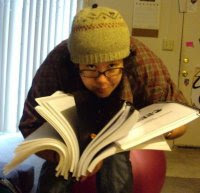
On November 9, 1989 representatives from fifteen countries gathered together to discuss the politics of food. From their discussion the Slow Food International movement was formed and began to promote their manifesto that, “[i]n the name of productivity, Fast Life has changed our way of being and threatens our environment and our landscapes. So Slow Food is now the only truly progressive answer” (“Manifesto” par. 8). Since its inception the Slow Food movement has spread to 122 countries. This movement is not the only one of its kind. In recent years the focus on food has been a critical part of the ecological movement, introducing new concepts and even new language to describe the human relationship with food (locavore for example). These movements represent a sensible ordering of thought around a logical central idea. Food is a logical point around which to organize ones feelings and actions regarding their relationship to nature and resource use, because food is one of the few items that make obvious human reliance on and interconnection with the natural world.
The body of American literature contains multitudes of works focused on humanity’s relationship to the natural world. Many of these works, especially in the 19th and 20th centuries, rely upon a worldview which vilifies the urban and elevates the wild as a sacred place apart. This tension between urban and wild is a central element in Willa Cather’s 1925 novel The Professor’s House. Characters such as Tom Outland and Louis Marsellus seem emblematic of this dichotomy. Even their names provide support for this concept, Outland (out-land) as the mesa dwelling place apart, and Marsellus (mar-sell- us) as the eager capitalist who Cather portrays as corrupter of Outland’s legacy. While this division has been widely accepted in many circles for generations, the concepts of glorified “wild” and vilified “capitalist” are not in the end polar opposites, but rather reflections of a similar human desire to manipulate and organize the natural world while conveniently ignoring the relationship between humanity and nature that exists at all levels of landscape.
A useful place for interrogating this binary in The Professor’s House rests in Cather’s representation of gardens. According to garden enthusiast and philosopher Mara Miller, “[t]he task of the garden is to mediate those tensions or polarities which are important for a given culture” (25).
Achievement unlocked – 52 movies
6 years ago


3 comments:
funny how most of us just read and don't see the hidden meanings behind the words just the words.such as that outland, i was thinking outback .deep so deep.
everything is fast,fast, fast! we don't take time to enjoy. We alll need to slow down especially when it comes to food. there is so much waste!
cool to see everyones names!!! yay
Post a Comment